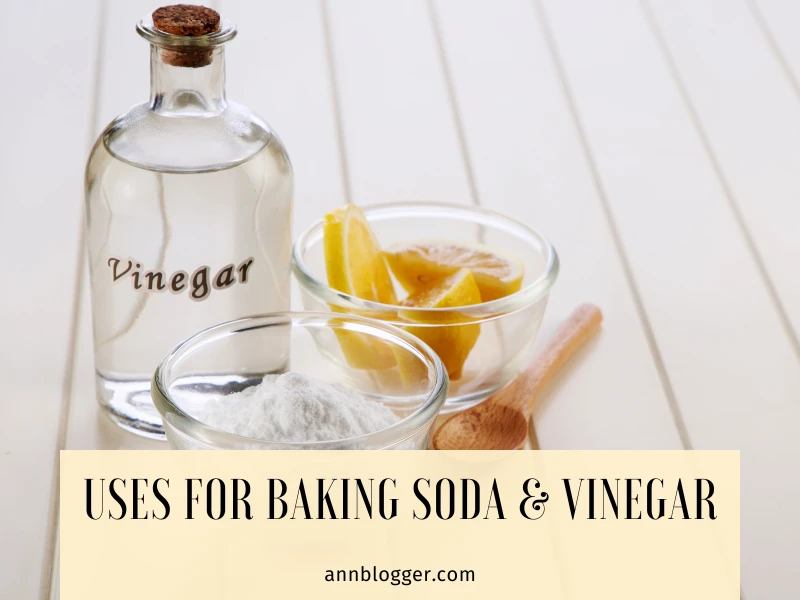75 Surprising Uses for Baking Soda and Vinegar
Baking soda and vinegar are true household superheroes. These two simple ingredients, found in almost every pantry, have earned their reputation as versatile, eco-friendly, and affordable problem-solvers. From tackling tough stains to neutralizing odors, the uses for baking soda and vinegar are nearly endless. Their natural properties make them a safe and effective alternative to chemical-laden cleaning products, offering a healthier choice for your home and the environment.
What makes baking soda and vinegar such a powerful duo? When combined, they create a chemical reaction that produces carbon dioxide bubbles, which help lift dirt, dissolve grease, and eliminate grime. This reaction is not only effective but also fun to watch—a perfect mix of science and practicality. Whether you’re cleaning your kitchen, refreshing your bathroom, or even tackling pet odors, the uses for baking soda and vinegar go far beyond traditional cleaning solutions.
However, like any powerful tool, it’s important to use these ingredients wisely. While they are generally safe, certain surfaces or materials may require a gentler approach, and overuse in some applications can cause damage. By understanding the best ways to use baking soda and vinegar, you can maximize their potential and keep your home sparkling clean without harmful chemicals.
So, if you’re looking to save money, reduce waste, and discover eco-friendly alternatives for your household needs, you’re in the right place. Let’s dive into 75 clever and practical uses for baking soda and vinegar that will transform the way you clean, deodorize, and maintain your home.
Why Baking Soda and Vinegar Work So Well Together
When baking soda, a mild alkaline substance, reacts with vinegar, a weak acid, they create carbon dioxide bubbles. This reaction is not only effective for cleaning but also fun to watch. However, it’s essential to note that their neutralizing effect means they shouldn’t be mixed and stored together. Instead, use them in combination immediately for the best results.
Kitchen Marvels
- Sink Drain Cleaner: Pour 1/2 cup of baking soda into the drain, followed by 1 cup of vinegar. Let it bubble for 10 minutes, then flush with hot water. Avoid using this frequently on older or corroded pipes to prevent wear.
- Fridge Deodorizer: Keep an open box of baking soda in the fridge to neutralize odors. Refresh monthly for maximum effectiveness.
- Cutting Board Cleaner: Sprinkle baking soda, spray vinegar, scrub, and rinse. Test a small area of wooden boards to ensure no damage to the finish.
- Dishwasher Cleaner: Run an empty cycle with 1/2 cup of baking soda and 1 cup of vinegar to remove buildup.
- Microwave Cleaner: Heat a bowl with 1 cup of water and 1 tablespoon of vinegar for 5 minutes, then wipe clean. Do not overheat the mixture to avoid spills or burns.
Bathroom Wonders
- Tile Grout Cleaner: Combine baking soda and vinegar into a paste, apply, scrub, and rinse. Test on a small section of grout to ensure compatibility.
- Toilet Bowl Cleaner: Sprinkle baking soda into the bowl, add vinegar, scrub, and flush. Ensure the bathroom is well-ventilated when using vinegar to avoid strong fumes.
- Showerhead Descaler: Soak the showerhead in a bag filled with vinegar for a few hours, then rinse thoroughly. Avoid using vinegar on brass or gold-plated finishes.
- Bathtub Scrub: Use baking soda and vinegar for a foaming scrub that removes soap scum effortlessly.
- Mirror Cleaner: Use a 50/50 vinegar-water solution for streak-free mirrors. Avoid using vinegar on mirrors with decorative finishes or wood frames.
Laundry Boosters
- Fabric Softener Alternative: Add 1/4 cup of vinegar to the rinse cycle for softer clothes.
- Stain Remover: Pre-treat stains with a paste of baking soda and vinegar. Always test on a small area of fabric first.
- Odor Eliminator: Add 1/2 cup of baking soda to the wash to neutralize smells.
- Brighten Whites: Soak whites in a solution of warm water, baking soda, and vinegar before washing.
- Iron Cleaner: Run diluted vinegar through your iron’s steam function to remove mineral buildup.
Eco-Friendly Cleaning
- All-Purpose Cleaner: Mix 1 cup of vinegar with 1 tablespoon of baking soda, dilute with water, and use for cleaning counters and more. Avoid using vinegar on granite, marble, or other unsealed stone surfaces.
- Carpet Stain Remover: Sprinkle baking soda on the stain, spray vinegar, let it fizz, scrub, and vacuum.
- Floor Cleaner: Mop with a mix of warm water, vinegar, and a splash of baking soda. Do not use vinegar on hardwood floors unless they are sealed.
- Stainless Steel Cleaner: Rub baking soda on surfaces, then rinse with vinegar for a streak-free shine. Test a small area first to ensure compatibility with the finish.
- Trash Can Deodorizer: Sprinkle baking soda in the trash can to absorb odors. Rinse with vinegar monthly for a deep clean.
Health and Beauty Uses
- Teeth Whitener: Use a paste of baking soda and water for gentle teeth whitening. Limit use to once a week to avoid enamel erosion.
- Hair Rinse: Rinse with 1 tablespoon of vinegar diluted in 1 cup of water to remove buildup. Use sparingly, as overuse can dry out hair.
- Foot Soak: Add 1/2 cup of baking soda to warm water for soft, odor-free feet.
- Natural Deodorant: Mix baking soda with a few drops of essential oil and apply to underarms. Discontinue use if irritation occurs.
- Sunburn Relief: Add baking soda to a bath to soothe sunburn.
Outdoor Hacks
- Patio Cleaner: Scrub outdoor furniture and patios with baking soda and vinegar.
- Weed Killer: Spray undiluted vinegar directly onto weeds. Avoid contact with plants you want to keep.
- Grill Cleaner: Make a paste of baking soda and water, scrub grates, then rinse with vinegar.
- Cooler Deodorizer: Sprinkle baking soda, spray vinegar, and scrub to remove odors.
- Car Odor Remover: Leave a bowl of baking soda in the car overnight to absorb smells.
Important Disclaimers
- Surface Compatibility: Always test baking soda or vinegar on a small, inconspicuous area before full application to avoid damage to surfaces like unsealed stone, wood, or delicate finishes.
- Frequency of Use: Avoid overusing baking soda and vinegar on teeth, hair, or drains to prevent potential harm like enamel erosion or pipe wear.
- Mixing Precautions: Do not mix and store baking soda and vinegar in a closed container as it can cause pressure buildup.
- Pet and Child Safety: Ensure thorough rinsing after use in areas where pets or children might come into contact with residues.
Uses for Baking Soda and Vinegar: Conclusion
With these safety tips and clever ideas, baking soda and vinegar prove to be an essential part of any household. Their versatility, affordability, and natural composition make them perfect for tackling everyday challenges, whether it’s cleaning stubborn stains, deodorizing smelly areas, or solving unexpected household dilemmas. From scrubbing kitchen surfaces to softening laundry, their uses seem endless, and with a little creativity, you may discover even more ways to put them to work.
The dynamic reaction of baking soda and vinegar is not just fascinating but highly effective in creating a cleaner, fresher home. By incorporating these uses into your routine, you can reduce your reliance on harsh chemicals and adopt a more eco-friendly and budget-conscious approach to household management. Whether you’re unclogging drains, freshening up your fridge, or making your mirrors shine, this duo is truly a game-changer.
What’s your favorite use for baking soda and vinegar? Have you tried something unique or unexpected that worked wonders? Share your tips and experiences in the comments below—we’d love to hear how these two powerhouses have made a difference in your home!
If you’re inspired by these uses for baking soda and vinegar and want to explore even more eco-friendly cleaning solutions, let us know! There’s always a new way to make your home cleaner, greener, and healthier with natural ingredients. Remember, the simplest solutions are often the most effective, and baking soda and vinegar are proof of that!

